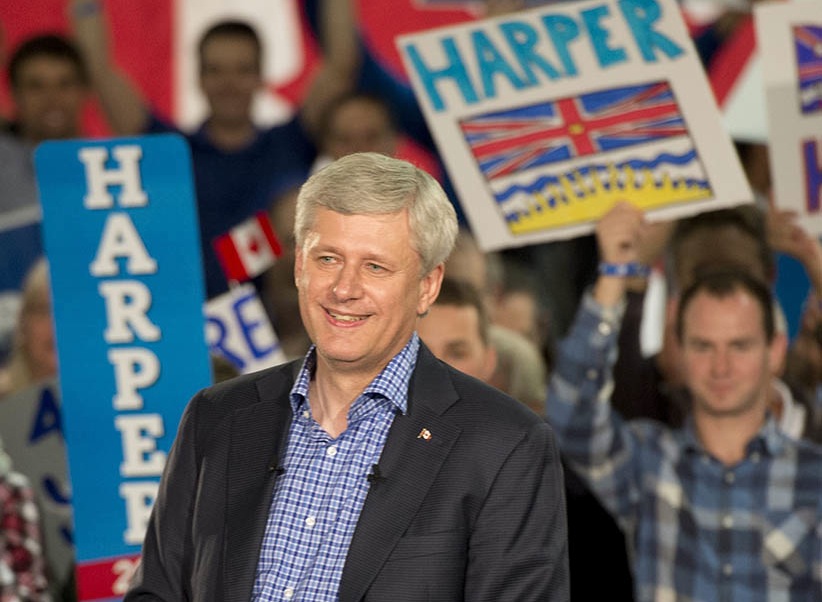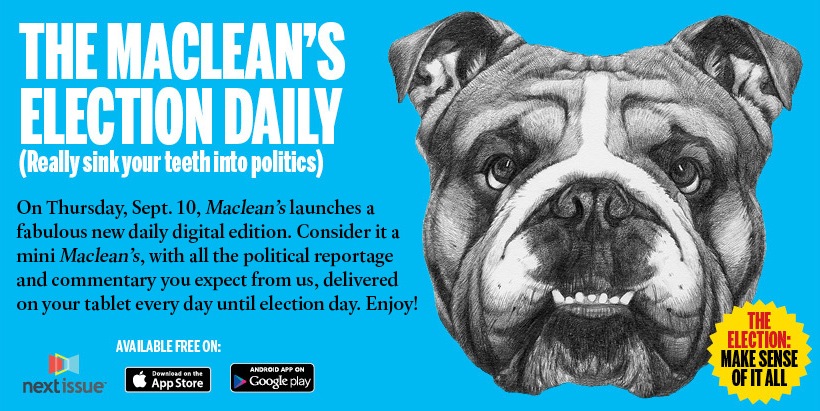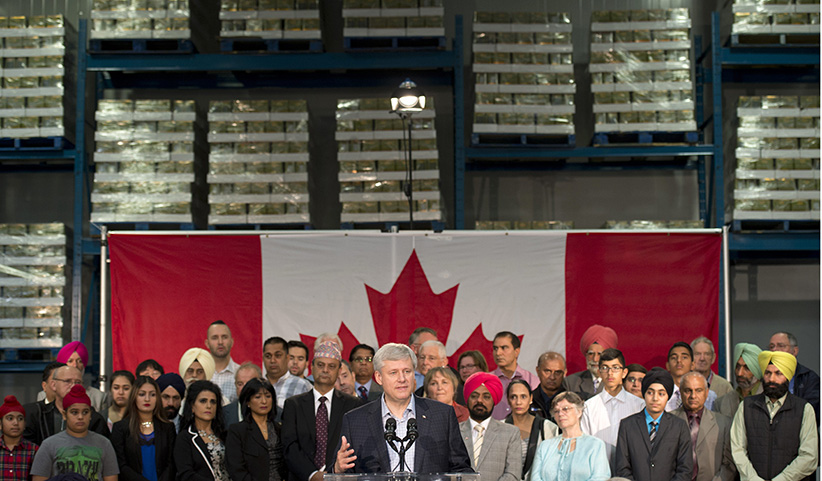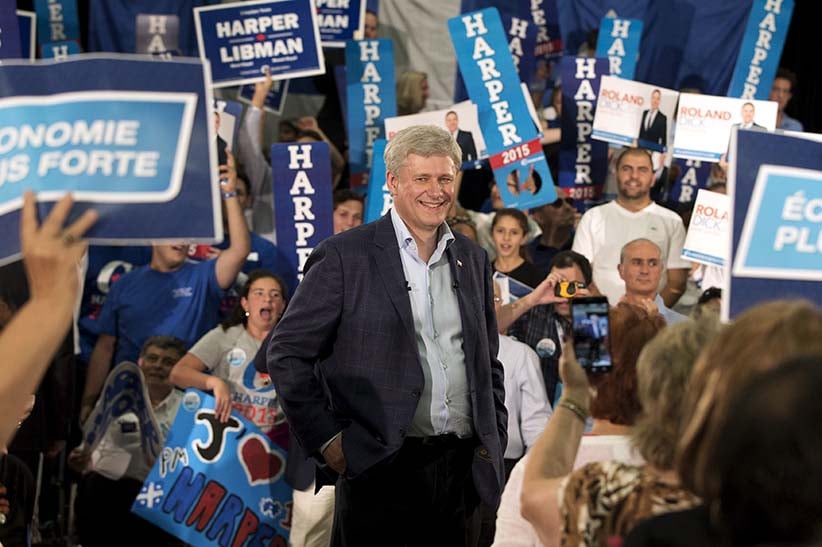Is this Stephen Harper’s last stand?
The Conservatives are in third place in the polls. But Stephen Harper is loose, almost joyful. Is this a man resigned to his fate?
Surrounded by racks of food, Conservative leader Stephen Harper speaks about the Syrian refugee crisis during a campaign event in Surrey, B.C., Thursday September 3, 2015. (Adrian Wyld/CP)
Share

“What is it with Abbotsford?” Stockwell Day asked the more than 400 Conservative supporters in suburban Vancouver who showed up at the Dynamic Windows factory the other night to hear Stephen Harper speak. “You folks always know how to light it up. Give yourselves a hand! There’s a fantastic turnout here.”
The Conservative leader’s campaign stops are almost unfailingly cheerful and upbeat, at least until the moment when, in morning events, travelling and local reporters are permitted to ask Harper five questions. But this was an evening rally; there would be no intrusions from the pesky press corps, and the mood among the Conservative faithful on this particular night was unusually buoyant.
The turnout was one of the largest yet for Harper in this campaign. The style of the meeting was more folksy and soulful, like an old Reform party rally, than most of Harper’s stops. Ed Fast, the local MP, whom Ottawa knows as the minister for international trade, introduced his ministerial predecessor, Day, who introduced Harper. Mark Strahl, the MP for Chilliwack–Fraser Canyon up the road, led the singing of the national anthem. Day told everyone he and Valerie are up to 14 grandchildren now. Fast acknowledged the presence of Chuck Strahl, the now-retired, long-time MP who’s Mark Strahl’s dad. There were so many bonds of kinship and politics in the room, it was hard for an outsider to keep track of them all.
“Now, isn’t it wonderful to be in a region of Canada with so many Conservative friends?” Fast asked the crowd. “This is, in fact, our Conservative family. And let me tell you, we’ve got a fantastic story to tell.”
One thing with Abbotsford is that it’s in British Columbia’s Bible belt, home to dozens of Lutheran and Anabaptist congregations and a growing Sikh population. Fast, Day and the Strahls are all churchgoing men. And while Harper’s exuberant half-hour speech was a variation on the discourse he has delivered at every stop of this long campaign, with a heavy emphasis on the economy and no religious content until he called at the end for God to bless Canada, his staff did make a few additions that would be particularly pleasing to this gathering of Conservative friends.
“Let the other guys explain—and I can hardly believe, when I read this list, I’m not making this stuff up—let the other guys explain their plans for drug-injection sites in your neighbourhoods,” Harper said, “for legalized marijuana and legalized prostitution, for ending mandatory prison sentences for even the most violent criminals, and for bringing back the wasteful and ineffective long-gun registry.” As he listed these social ills, some in the audience audibly moaned. When he finished, the applause was tumultuous, as it was when Harper pledged to “continue to support Israel’s right to exist as a Jewish state.”
When it was over, Harper called it an evening and resumed the measured pace he has pursued throughout the campaign’s first month. It is the classic pace of the modern national leader’s campaign, not far different from what Thomas Mulcair and Justin Trudeau are doing, predicated on the very strong belief among political professionals that there is nothing to be gained from running a leader into the ground.
INTRODUCING THE BULLDOG*

On most days, there is a morning “message event,” designed to announce a platform plank or emphasize some element of the Harper government’s record. There is a quick event mid-afternoon, a photo opportunity or a short rally for a small crowd. And there is a larger rally in the evening designed to fire up campaign workers, generate local coverage, and get some positive word-of-mouth going throughout a region. And that’s it.
After the morning message event, the reporters bring everyone down with their pesky questions. On Harper’s tour, which I joined for three days last week, this scrum always happens in front of a partisan audience, invited by the local party organization, identified ahead of time through a record of donating to the party or working on campaigns. Now that the fraud trial of suspended Sen. Mike Duffy is on hold until November, Harper’s morning exchanges with the scribes are a little less Arctic in tone. But Harper plainly enjoys his pep talks to Conservative troops more than these daily confrontations with the scribes.
His speeches on the road would come as a surprise to anyone who has seen only the nightly news clips of Harper dodging questions about Duffy, Nigel Wright, Ray Novak and Syrian refugees. The Prime Minister is at least 15 lb. lighter than when he campaigned in 2011. He stands straighter, delivers his lines with more élan, and seems in a genuinely far better mood than four years ago, when he slouched and grumbled his way to a third consecutive election victory. Sometimes he even permits himself to be funny, in a way he has hardly risked in years. “Now friends, I want you to remember this statistic,” he said as he bragged about the Conservative record on trade in Abbotsford, “because, every so often, the Liberals jump up and say, ‘Oh, we support trade, too.’ ” He delivered the supposed Liberal talking point in a whiny, cartoon falsetto that sounded heavily influenced by David Letterman. It made me laugh out loud in the middle of the Dynamic Windows factory. And again, days later, when I was transcribing my recording of Harper’s remarks.
Stephen Harper is having a ball out there on the road, loose and cheerful, and it’s all a bit jarring, because there is no poll so far that suggests he can hang onto a Conservative majority in the House of Commons after Oct. 19. Most polls suggest he is not on track to win this thing in any way. Some show the Conservatives in third place, behind Mulcair’s NDP and even Trudeau’s hated Liberals, whose collective voice rings in Harper’s head like a voice from a cancelled late-night talk show.
Maybe Harper knows something we don’t. Maybe he can’t see the gathering clouds. Or maybe the Conservative leader knows what we know—that this may be his last hurrah—and he’s okay with that.

Every day, he tells invited audiences who have demonstrated their loyalty to Canadian conservatism the things they most want to hear. In Whitehorse, at the morning event, he was introduced by Ryan Leef, the incumbent MP who had leapt from the bushes a few nights earlier to inflict a citizen’s arrest on a neighbour who had been defacing his campaign signs. A campaign staffer told me this riding had the highest per-capita rate of gun ownership in Canada. Bingo. Harper promised he would “not ever reinstate the long-gun registry.” He vowed to promote angling, hunting and snowmobiling. He managed to promise both to introduce “a specific wildlife conservation and enhancement program” and to “remove a bunch of the barriers and irritants that bird hunters have been telling us about.”
At every stop, he tells people who want him to keep being Prime Minister that he will soon be even more of the Prime Minister they want. Safe neighbourhoods for the fantastic Conservative family in Abbotsford. Wildlife protected until the precise moment of its sporting demise in the Yukon. Odes to business acumen, delivered in front of a wall-sized Quebec flag, for the entrepreneurial nationalists of the Quebec City region. Paeans to the new Canadian mosaic in the bustling suburbs around Toronto.
It’s not all that different from what Mulcair and Trudeau are doing. The crowd at an NDP rally is composed, for the most part, of faithful New Democrats who have been cajoled into showing up by the local and national NDP campaigns. The difference is the exquisite degree to which Harper’s staff have refined the technique. Nobody gets into a Harper event without an invitation. No message escapes his lips that did not get there from a teleprompter. The campaign is a feedback loop, supporters to leader and back.
It took something big to rock Harper out of that loop last week. What it took was the worldwide release of news photos showing little three-year-old Alan Kurdi lying dead on a beach in Turkey.
Alan, his brother, Galib, and his mother, Rehanna, died along with 10 other Syrian refugees when their boat capsized. Harper was in Surrey, B.C., when the news hit his tour. His press spokesman, Kory Teneycke, paced up and down a sidewalk for almost an hour in front of the hotel where the Conservative campaign tour had spent the night, his phone to his ear as Conservatives decided how to respond. At last, word came out that Harper would hold his scheduled morning event in front of an invited partisan crowd in a food warehouse, but that he would deliver no campaign promise, only a statement on the tragedy.
At the moment Harper eventually spoke, there were conflicting reports about which members of the Kurdi family had applied to come to Canada. The bitter debate over Immigration Minister Chris Alexander’s role in handling their request still lay ahead. But what soon became clear was that Harper intended to draw a sharp distinction on Syrian refugees between the Liberals and New Democrats, on one hand, and his own party, on the other.
Those other parties want Canada to admit more Syrian refugees. Harper suggested Canada need be no more welcoming than it had already planned to be. “Our country has the most generous immigration and refugee system in the world. We admit, per capita, more people than any other.”
Related: Making sense of Canada’s refugee and immigration numbers
To be polite, this was a stretcher. On the issue of the day, refugee resettlement, there is no independent international source that ranks Canada ahead of all other countries. But Harper’s point was that merely accepting refugees wouldn’t be enough. To him, Syria and Iraq have been transformed into a massive machine for generating waves of refugees, and it is long past time to break the machine. “We are also doing what we have to do to try and fight the root cause of this problem. And that is the violent campaign being fought against millions of people by Islamic State. That is why we are part of the international military coalition.”
The invited crowd applauded at this, and there is reason to believe Harper’s message of refugee resettlement plus air strikes against Islamic State will find support among some Canadian voters. Various polls since last autumn have suggested that, while opinion on Canada’s participation in the anti-Islamic State coalition is sharply divisive, Harper’s policy has had more supporters than detractors. In the days after Harper spoke, both British Prime Minister David Cameron and French President François Hollande suggested they will step up their military action against Islamic State in Syria. They appear to have reached conclusions similar to Harper’s.
Related: The Syrian refugee tragedy becomes a political battleground
Taken at the average, a month’s worth of public opinion polls suggest Canadian voters are moving toward different conclusions. The poll aggregator ThreeHundredEight.com said on Tuesday that the Conservatives had fallen four points in six weeks, in the average of all publicly available national polls. The NDP has held steady for a month, and the Liberals have pulled ahead of the Conservatives into second place. After the millions of dollars Harper has allocated to advertising barrages against Trudeau over two years, that’s gotta hurt.
But if Harper is feeling any pain, he does not let it show on the road. Neither do the Conservatives who travel with him, including Kory Teneycke and the campaign director, Jenni Byrne. On Friday, as campaigning Conservatives and a tiny contingent of journalists boarded the Conservatives’ chartered Air Canada jet to fly back to Ottawa, another reporter called a question to the Prime Minister. “How does this thing end?”
Harper smiled and spread his arms wide. “We’re gonna win this! Come on!”
I have three competing theories to explain this chipper mood.

Maybe he’s going to win. Maybe he has a plan to turn this campaign around, and he’ll punch the secret button any day now. This possibility should never be discounted, as it is how the elections of 2006, 2008 and 2011 ended. In both 2008 and 2011, the final vote the Conservatives obtained was a few points higher than the average of the polls at the end of the campaign. But every poll in 2011 showed the Conservatives in first place. This year, almost none has. And the trend is heading in the wrong direction.
So maybe Harper is losing and doesn’t know it, or refuses to believe it. I have a lot of time for this theory. In previous campaigns, he took care to surround himself with a few people whose vision of conservatism was a few degrees different from his own, people who weren’t afraid to speak truth to power. He asked Bruce Carson, a veteran Progressive Conservative, to take over the drafting of his 2006 campaign because Carson was, he said, “a little to my left.” (Carson’s reply: “You’ve got that right.” Carson was unavailable to work on the campaign this year, as he is about to go on trial for influence-peddling.) In the same year, Harper appeared at a campaign rally with Bill Davis, whose tenure as Ontario’s centre-left Progressive Conservative premier Harper had publicly criticized in another life. This is the sort of thing you do when you want to show you can build a big tent—when, indeed, you actually want to build a big tent and live in it.
Harper is doing the opposite this year. He is hunkering down. Byrne and Teneycke tend to pull him to the right, not moderate him. His audiences are, by design, not going to disagree with much he says. Waves of party leaders going back to Pierre Trudeau have worked to perfect the bubble campaign; Harper’s tour stops have traced an archipelago of bubbles across the country. In Moby-Dick, Herman Melville describes a former whaler turned Massachussetts preacher, Father Mapple, who climbs a rope ladder to his pulpit, then pulls up the ladder behind him, “leaving him impregnable in his little Quebec.” The reference is not to the province or the city; it’s to the Citadelle, the fortress built on a promontory outside the old city. With mixed results, and despite occasional incursions from the real world, Harper has tried to take his little Quebec with him on this tour. Maybe no news gets in.
[widgets_on_pages id=”Election”]
But, for the most part, I can’t really bring myself to believe this, which leaves one more possibility. Maybe Harper knows he is probably going to lose this election. Maybe he has made his peace.
As early as 2009, Conservatives close to Harper were describing his political aims in terms that lasted beyond Harper’s own career as leader of the Conservative party. Earlier Conservative leaders—John Diefenbaker, Brian Mulroney—had left their parties so worn out that their opponents rolled over them, leaving them without influence for many years. If the Liberals have been Canada’s natural governing party, in this analysis, it’s because Conservatives have failed to build something that could last and compete long after the first flush of a new leader’s novelty.
For at least half a decade, then, Harper has conceived his Conservative party as a vehicle that must remain attractive to voters after he’s gone. Of course, wishing doesn’t make it so. Who would replace Harper as leader is an open question, and whether any of the likely successors would prove formidable in a general election campaign is another.
But, unlike most leaders, Harper has grown used to thinking of his party’s future after his own leadership ends. I believe this habit of mind provides the best explanation for why he’s even bothered to lead the party into this campaign.
As all kinds of observers were saying a year ago, most leaders facing polls as lousy as the ones he was looking at would have resigned and handed the leadership over to some poor chump who could take the fall, a John Turner, a Kim Campbell.
The fate of such replacement leaders is well-known. It takes a different kind of leader to engineer a soft landing for a party that can’t win. Jean Charest managed that feat in Quebec in 2012. Louis St. Laurent did it in 1957, losing to Diefenbaker by seven seats. Both men left behind Liberal parties that would not stay out of the game for long.
At every stop, Harper tells his hand-picked audiences he is the man who must win. But there is no keener student of Canadian political history than Harper, and he must know that, should it come to this, for Canadian conservatism, he is also the best man to lose.